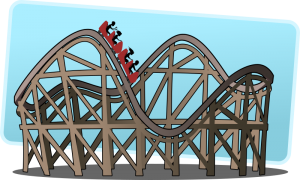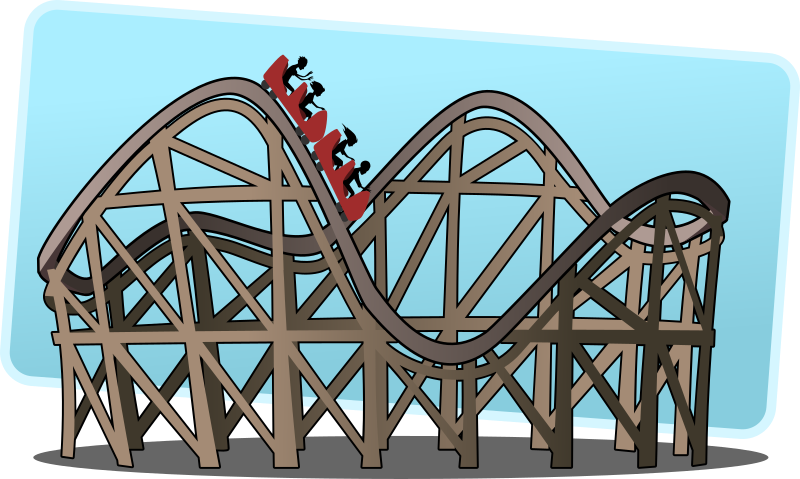 I want to share this with you – it’s not scientific in any way, but a process that me and my dear ones / friends / colleagues have all observed (and we deal with learning a lot). It turns out that when we begin learning, the same things can happen quite often – and when we stop, we go through similar sequences. See if this sounds familiar…
I want to share this with you – it’s not scientific in any way, but a process that me and my dear ones / friends / colleagues have all observed (and we deal with learning a lot). It turns out that when we begin learning, the same things can happen quite often – and when we stop, we go through similar sequences. See if this sounds familiar…
When you learn
1. The hype gets to you. This is probably the most common reaction to learning something new and trying it out. “Amazing! I can play some chess,” or “I just understood a Spanish word!” are all common reaction. It’s the equivalent of opening up a door that you didn’t know was there.
2. You realize that you suck. Inevitably, the amount of stuff you need to cover makes you understand how much still needs to be learned. That’s when your chess game becomes a neverending tangle of choices, and your Spanish becomes a maze. That’s a good thing, though, because…
3. You work out your own patterns. You don’t need to use all the moves on the chessboard. And you don’t need every single Spanish grammar structure. Bit by bit, you start to take pieces that do the job – and putting them to use. Your opening is down to 2 good moves, then to three, then to four moves and 2 variations. Your Spanish chat with the landlady covers just the weather, then your weekend, then your plans and your weekend and the weather… The tools and patterns begin to work for you. This is when…
4. Your style begins to shine through. Seriously, it does take that long. The things you do get arranged in patterns, sequences, and the way you use them – or avoid using them – starts to resemble what you generally prefer to do. Someone can now look at your game, from opening to endgame, and make conclusions about what kind of player you are. Someone can read an email you sent in Spanish and decide if you were angry, relaxed or assertive. This is a good stage to be, because if you keep it long enough…
5. You become an expert. This does not happen for everything you study. It doesn’t even happen for the majority of things. But one or two of them are important. One or two things which truly, really matter to you. Maybe it’s chess or Spanish. Maybe it’s the guitar. Maybe it’s spreadsheets. You go through the four steps – and then reach a level which few other people reached. Maybe you’re the “best in the world” (according to Seth’s definition)!
Sounds good? Check out the reverse direction now…
When you stop learning
1. You lose your expertise. A surgeon who finds no time for reading and research is a little bit behind in his work. He’s no longer 100% able to use the latest machinery, or no longer current on the latest diagnosis methods. A chess player who stops following tournaments, games and commentaries will lose her edge – she will no longer be able to decipher, understand and react to the trends in other experts’ games.
2. Your style begins to get hazy. This is the chess player who no longer trusts her flair enough to risk an unconventional move – and resorts to the handbook exchange instead. This is the Spanish speaker who finds it easier to just say the well-rehearsed filler formula, and not express what he really means.
3. Your patterns get rusty. This is when the handbook opening no longer fills you with confidence (where did the knight go again?), when the Spanish phrase feels a bit shaky (is that the correct verb here?). You still know there is a pattern, but you’re no longer sure you’re getting it right – like when you recall three out of four finger positions in a guitar chord, something’s not sounding good.
2. You realize that you suck. “Man, I knew all these things once, I was ace!” The previous three steps are now obvious, and you see how much has escaped. This is when your high school Spanish becomes reduced to some individual words – when your keen chess game becomes just rudimentary rules and practice. It’s good to realize this step, though, because the next one can be…
1. You lose the hype completely – or
1. You find the hype again. Wipe the dust off the chessboard. Find a cassette player capable of playing your Spanish tapes again. Learn how to play “A Horse With No Name” in one evening. This time, your ride will feel doubly great – you may experience the ride up again, but also a deja-vu: “I learned this before.” This is my favourite bit – finding a long-forgotten Spanish phrase just as it rolls of your tongue, or discovering that you do know where the knight will go, and what to do with the rook, and that you played this game before.
Guys – do you find yourselves going through these stages when you learn? Am I missing a crucial stage here? Let me know!
Wiktor (Vic) Kostrzewski (MA, DELTA) is an author, translator, editor and project manage based in London. When he works, he thinks about languages, education, books, EdTech and teachers. When he doesn’t work, he probably trains for his next triathlon or drinks his next coffee.
BRAVE Learning (formerly known as 16 Kinds) is a lifelong learning and productivity blog. If you enjoy these posts, please check out one of my books and courses.
My recent publications, and my archive, is now all available on my new project: PUNK LEARNING. Hope to see you there!

